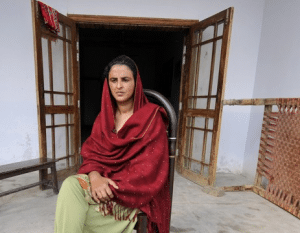A Setback for Pakistani Women
April 26, 2011
 POLITICO – LAHORE, Pakistan — The amazing thing is that she stayed. For the past nine years, Mukhtar Mai has lived in the same village where she was allegedly dragged into a house, raped and pushed out naked, while 200 higher-caste tribesmen sat in approval nearby and her father was too frightened to save her.
POLITICO – LAHORE, Pakistan — The amazing thing is that she stayed. For the past nine years, Mukhtar Mai has lived in the same village where she was allegedly dragged into a house, raped and pushed out naked, while 200 higher-caste tribesmen sat in approval nearby and her father was too frightened to save her.
Mai stayed in the community through tortuous police and judicial investigations, recounting her humiliation to male officials who doubted her story or were beholden to her alleged attackers, and to judges who acquitted most of the 14 men accused in her tribal punishment of revenge rape.
She remained in Meerwala, a primitive sugar-growing village in the poorest part of Punjab province, even after she became internationally known as a symbol of women’s rights. Showered with awards and prizes, she used the money to build a private school.
This week, after a Supreme Court panel ruled Thursday that it did not believe the prosecution’s version of what happened to Mai on June 22, 2002, and set all but one of the remaining defendants free, she said she still intends to stay there.
“I have had offers to move to Canada or America, but this is my place and I am needed here,” Mai, 42, said in a telephone interview from Meerwala on Saturday. When news of the verdict came, she said, “many villagers showed sympathy, but the landlords gave out sweets,” a gesture of celebration.
Pakistani women’s advocates said they feared the ruling will reinforce some of the cruelest traditions relating to women in rural society, where justice is meted out by semi-literate village leaders and the dominant land-owning clans wield more power than the police.
One tradition is the system of “panchayats” or “jirgas,” in which village leaders settle disputes over women with forced marriages, stonings and other punishments. Another is the tight-knit “baraderi” or clan structure, which enables stronger tribes — in this case the Mastois — to abuse weaker ones, such as Mai’s Gujjar clan, with impunity.
“The court could have sent a strong message against these parallel justice systems, which we have been struggling so long to change,” said Rukshanda Naz of the Aurat Foundation for women in Peshawar. “Instead, this will make those elements feel more confident. It shows that the patriarchal mind-set in Pakistan still exists at every level.”
Pakistan’s constitution bans violent abuse of women, but social pressure, political influence and community “honor” are often stronger than the law. In 2009, rights groups found 8,548 reported cases of murder and assaults on women, many committed by relatives or ordered by tribal councils. They said far more cases are never reported to any state authority.
The unique aspect of Mai’s attack was not that it occurred, but that she spoke up. Her long journey through the legal system was a closely watched test case, and observers said the court’s rebuff may deepen the silence surrounding the abuse of other rural women.
The court’s ruling showed a keen understanding of traditional village mores, including the “extreme sensitivity” of premarital chastity. The mere rumor that Mai’s teenage brother was seen alone in a field with a Mastoi girl sent her clan into a vengeful frenzy. Within 24 hours, clan leaders had either ordered Mai to instantly “marry” the girl’s brother (according to the defense) or to be raped by him and his relatives as compensation. He was the only defendant whose prison sentence was upheld.
Yet justices in the 2 to 1 majority decision expressed little sympathy for Mai. They questioned why her family took a week to report the crime and sarcastically dismissed their fear of the “alleged mighty” Mastois. They questioned how Mai could identify her attackers in the dark and why she gave conflicting accounts of how her clothes were torn off. They suggested that a local Muslim cleric was a “mastermind” who concocted the plot.
In contrast, the judges referred often to the “presumed innocence” of the defendants and dismissed the relevance of reports that several had sodomized Mai’s brother, then 13, and made up the story about the girl. A doctor found that the boy had been sodomized, but the judges in the majority did not believe he was too ashamed or scared to tell the police.
Only the dissenting judge, Nasir ul-Mulk, acknowledged the “arrogance” and impunity of the landlord clan in that community, and what it meant for Mai to take her case to the police. “An illiterate woman of rural humble background,” he wrote, “mustered tremendous courage to stand up against powerful influential culprits to bring them to justice.”
In the interview, Mai said she feared violence from the freed defendants and noted that their clan has powerful local patrons in the ruling Pakistan People’s Party. But she said she was determined to keep helping girls in her community study, gain confidence and demand their rights.
To read the Politico article, click here.

